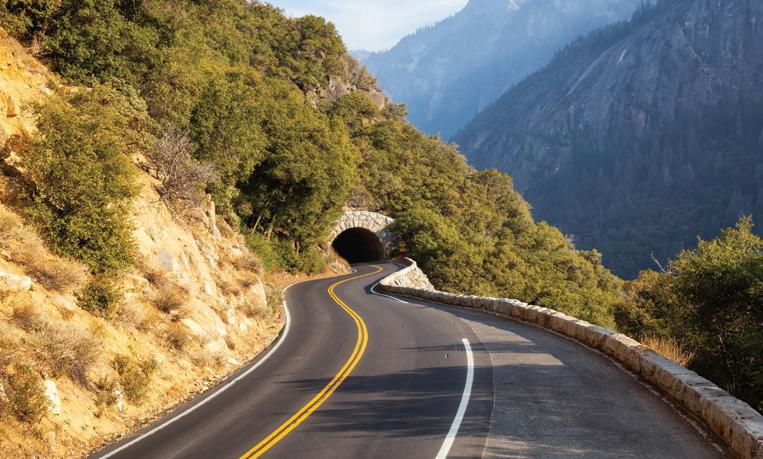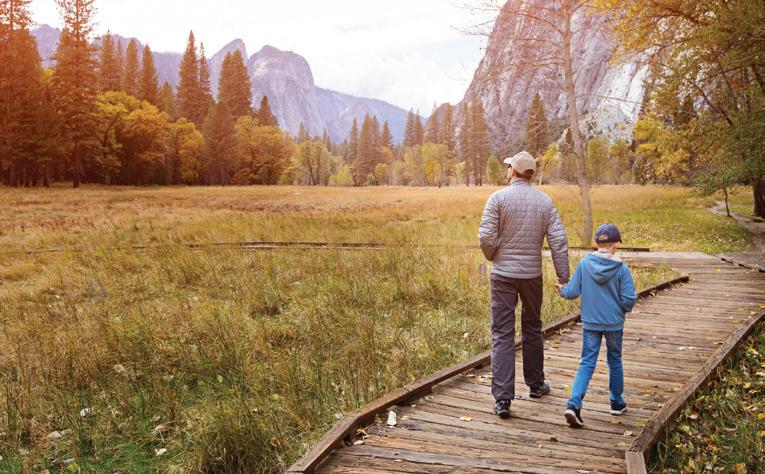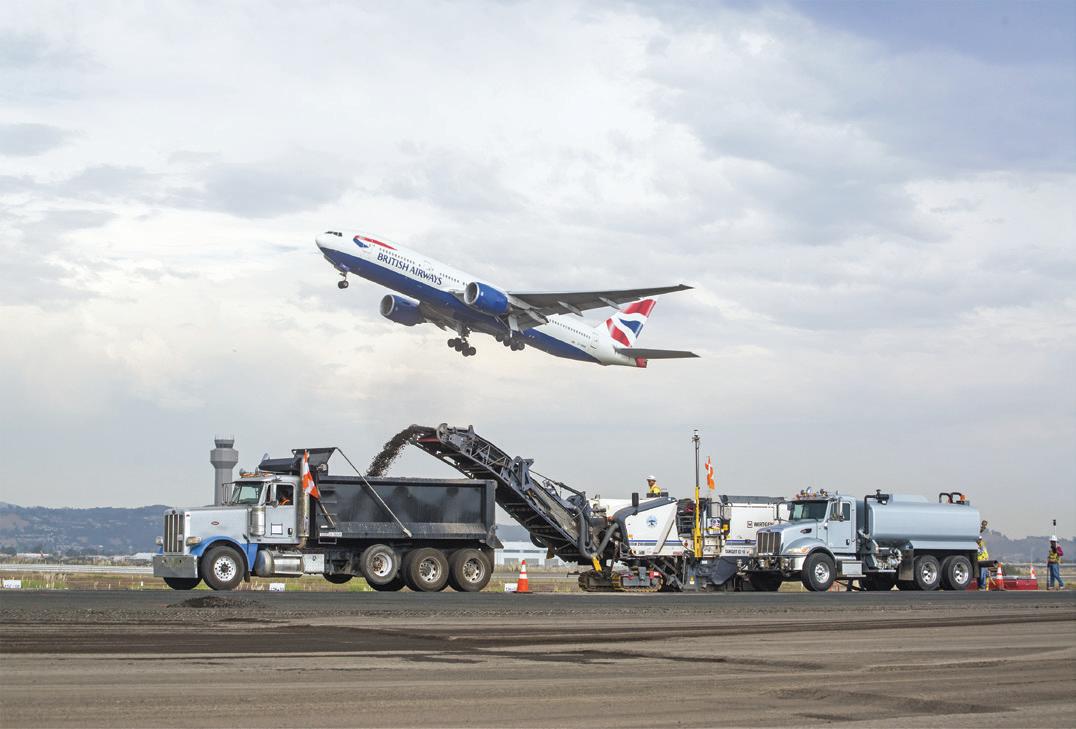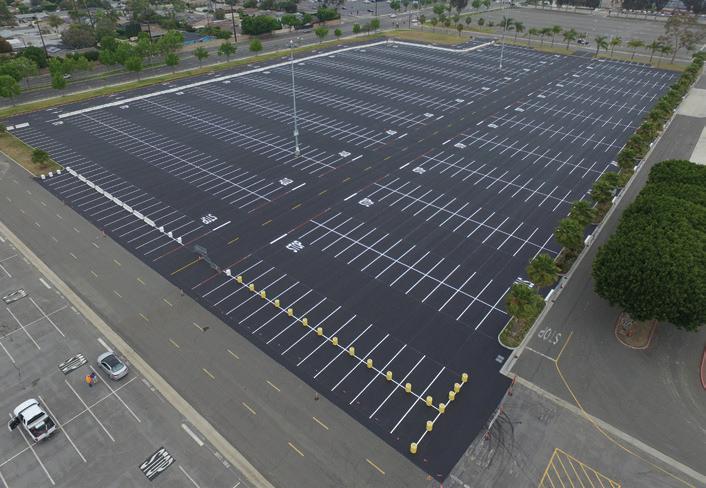
7 minute read
The Pew Charitable Trusts asks Congress to invest in our National Parks that currently suffer from years of deferred maintenance
By Brian Hoover, CMS
The Pew Charitable Trusts (Pew) is an independent nonprofit organization that is working to raise awareness about the $12 billion repair backlog facing the National Park Service (NPS) and implement long-term solutions to address the challenge.
In 2015, Pew launched the Restore America’s Parks initiative and is working with Congress and a broad array of national, regional, and local stakeholders to enact legislation that would direct dedicated annual federal funding to priority park repairs. The last time NPS received a major congressional investment for infrastructure and improvement was in the 1950s, under a program called Mission 66. Many of the facilities that were constructed or upgraded under that program have now fallen into disrepair.
The National Park Service has now entered its second century, and many of the 419 sites and 62 national parks it manages are showing their age. Roads and bridges are crumbling; historic buildings and monuments are deteriorating; trails are rundown; and water, sewer, and electrical systems are outdated and sometimes unsafe. Federal funding has proved to be unreliable and the agency is struggling to keep pace with the repairs, estimated to now be in excess of $12 billion.
NPS maintains around 5,500 miles of paved roads ($4.3 billion deferred), and they are responsible for another 28,000 buildings ($2.2 billion deferred), including visitor centers, employee housing, historic buildings, and maintenance sheds. Parking lots are in disrepair with more than $1 billion in deferred maintenance, while the NPS’ 1,700 road bridges have had nearly the same dollar amount deferred. The list continues with long needed repairs for marinas, landscaping, trails, water systems, electrical systems, monuments and so much more.
So, what is deferred maintenance and exactly what is being done about it and by whom? Simply put, deferred maintenance is work that has not been completed at required intervals to ensure acceptable facility and infrastructure conditions. Maintenance work is typically considered deferred if it is delayed for a year or longer. The jobs and benefits that would result from fully funding NPS’ deferred maintenance include construction workers repairing roads, preservation
The National Park Service maintains around 5,500 miles of paved roads.
experts restoring deteriorating historic sites, and engineers overhauling outdated sewer, water, and fire prevention systems.
A recent poll commissioned by Pew shows that 82 percent of Americans want Congress to pass legislation—now pending—to invest up to $1.3 billion per year over five years to address these overdue repairs. That percentage is up from a similar Pew-commissioned telephone poll in November 2018, which found that 76 percent of Americans supported legislation to address the maintenance backlog. The most recent survey, conducted in June 2019 by the bipartisan research team of New Bridge Strategy and Fairbank, Maslin, Maullin, Metz & Associates, revealed strong support for the
Left: A vehicle participating in the “Park-toPark” tour of the Western United States in 1920 encountered rough going. In the decades since, the construction of asphalt roads and parking lots have greatly improved accessibility for U.S. parks nationally and in California.

Below: There are currently 62 national parks within 29 states and all of them suffer in one way or another from deferred maintenance.
legislation, which would create a fund of up to $6.5 billon to address park repairs by using payments that oil and gas companies are already making to the federal government for operating on public lands and waters. The June poll also found that nearly two-thirds of U.S. voters believe NPS lacks adequate funds to maintain its sites. A similar percentage wants Congress to allocate more federal highway funds to address the backlog of transportation needs—such as road repairs—which account for about half of the total deferred maintenance.
In the 116th Congress, Pew and a coalition of businesses, organizations, and local elected officials advocated for a dedicated federal funding source that would help pare down the deferred maintenance backlog. A bipartisan group of members of Congress introduced the Restore Our Parks and Public Lands Act (H.R. 1225) and the Restore Our Parks Act (S. 500), which would provide $6.5 billion over five years to address priority deferred maintenance projects. The bills enjoy strong bipartisan support in Congress, with more than one-third of senators and more than two-thirds of House members backing the bills. At the same time, a coalition of conservation groups and outdoor recreation proponents were proposing a permanent funding plan for the Land and Water Conservation Fund (LWCF), an important parks and recreation program that not only conserves federal public lands but provides funding to state and municipalities for restoration and development of outdoor recreation facilities.
Congressional members worked out a deal to combine the two programs into one bill, the Great American Outdoors Act (S. 3422). This bill would direct $9.5 billion in non-taxpayer monies to address priority repairs in national parks and on other public lands. The National

Park Service would receive 70 percent of the fund proceeds; the U.S. Forest Service would receive 15 percent; and the U.S. Fish and Wildlife Service, the Bureau of Land Management, and Bureau of Indian Education schools would each receive 5 percent. Also included in the bill is full funding for LWCF. Pew is among close to 1,000 national, regional, state, and local groups, including CalAPA ® , urging Congress to pass the Great American Outdoors Act. “There is overwhelming bipartisan congressional and public support for this effort throughout the country, and the president has indicated that he will sign the legislation into law,” said Tom St. Hilaire, senior officer, Pew.
In addition to advocating for federal funding, Pew also points to strategies that have the potential to help cut the current deferred maintenance backlog or raise additional funding for infrastructure repairs. A report commissioned by Pew and researched and written by the engineering, design, and project management firm AECOM—identifies strategies that have the potential to cut the backlog by $3.7 billion over 10 years. These would include the transfer of some expendable assets to other entities, demolishing nonessential underutilized buildings, and returning some unneeded paved trails, roads and parking lots to nature. Other ideas include posting a QR code at park sites, allowing visitors to directly donate to the maintenance fund. Other strategies call for raising specific park fees, tolling NPS parkways, or even charging for customized park experiences. Modern technologies also have been discussed, including the use of cutting-edge road materials in construction that can prevent or postpone cracking and other deterioration leading to costly repairs.
National park sites in California are part of a system that encompasses 84 million acres across the United States. The National Park System supports more than 35,000 jobs in California and more than 300,000 jobs nationally. “Our national parks are not only important places to visit— offering educational and recreation opportunities to visitors—they are proven economic drivers, playing host to more than 41 million visitors each year in California, and adding nearly $3 billion to our state economy,” said Mike Herlax, San Francisco Bay Area asphalt operations manager for CalAPA ® member company Lehigh Hanson Inc., and also currently serving as Board Secretary of the association. “Infrastructure-related jobs help to ensure the longevity of parks in California, maintain a positive visitor experience, and benefit our local, regional, and state economies. This is essential to the quality of life we cherish here in California.”
For more information on pending legislation or The Pew Charitable Trusts, please visit https://www.pewtrusts.org/en/ projects/restore-americas-parks CA
Brian Hoover is co-owner of Construction Marketing Services, LLC, and editor of CalContractor Magazine.
Editor's Note: This article was written in cooperation with The Pew Charitable Trusts, along with research from articles, studies and information gleaned from www.pewtrusts.org, among other sources.
CA Lic. #569352

1 0 0 % E m p l o y e e O w n e d
SERVICES OFFERED Cold Milling Cold In-Place Recycling (CIR) Cold Central Plant Recycling (CCPR) Diamond Grinding Soil Stabilization Full Depth Reclamation Pavement Preservation Winterization & Dry-Ups Value Engineering Contractor Support
We have you covered!

Delivering consistent, professional quality and superior service to the asphalt industry for over 25 years, Diversi ed Asphalt is southern California’s leading seal coat manufacturer and asphalt service provider.
From quality seal coat products and subcontracting support to equipment rentals and more, turn to Diversi ed Asphalt Products for exceptional service and lasting value.

Subcontracting Division
• Full Service Oil Spreading • Paving Fabric Installation • Tack & Prime Coat • Fog Seal • Crack Filling Equipment Rental • Hot Crack Filling Machines • 600 Gallon Seal Tanks • 6,000 Gallon Yard Tanks • 6,000 Gallon Job Site Tanks
Manufacturing Division
• OverKote® Seal & Crack Filler • SS1H Emulsion • Paving Fabric Rolls • Petrotac and Geotextiles • Oil Flow and Oil Spot Sealer • Latex Additives • Hot Soup Buckets • Diamond Shield Forti er

DIVERSIFIED ASPHALT PRODUCTS
1227 NORTH OLIVE STREET • ANAHEIM, CA 92801 TOLL FREE: 855-OVERKOTE • 855-683-7568 diversi edasphalt.com




